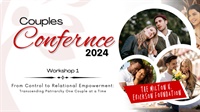CC24 Workshop 01 - From Control to Relational Empowerment: Transcending Patriarchy One Couple at a Time - Terry Real, LICSW
- Average Rating:
- Not yet rated
- Topic Areas:
- Workshops | Couples Therapy | Relational Life Therapy Model (RLT)
- Bundle(s):
- 2024 Couples Conference Bundle
- Categories:
- Couples Conference | Couples Conference 2024 | Pioneers in Couples and Family Therapy
- Faculty:
- Terry Real, LICSW
- Course Levels:
- Master Degree or Higher in Health-Related Field
- Duration:
- 1:30:25
- Format:
- Audio and Video
- Original Program Date:
- May 03, 2024
- License:
- Never Expires.
Description
Description: This presentation introduces Relational Life Therapy (RLT), a three-phase approach centered on awakening clients, confronting truth with compassion, and engaging in deep trauma work. It addresses power imbalances in couples by identifying “blatant” and “latent” roles, and emphasizes forming therapeutic alliances with clients’ wise adult selves. Key themes include relational mindfulness, empathy, managing grandiosity, and promoting systemic change for lasting relational transformation.
Syllabus Description: Relational Life Therapy, (RLT) specializes in couples on the brink no one else has been able to help. We produce deep, lasting change quickly by helping our clients step into a new world. We offer a map for a new way to live and a practical toolbox to realize it. Our clients move beyond the individualistic patriarchal mores we’ve all grown up with to discover the ecological wisdom of relationship, interconnectedness. This is not pie in the sky idealism but rather a practical “relational technology” that can effectively equip our clients to create and sustain the lifelong lover relationships we now long for.
Couples first learn to think relationally – which is itself transformative. For example, the relational answer to the question: “Who’s right and who’s wrong?” Is: ‘Who cares?” What matters is: “How do we face the issue at hand in a way that works for both of us?”
RLT takes place in three stages
- Waking Up The Client
Loving confrontation (joining through the truth) forms an immediate therapeutic alliance by helping clients see the repeating dysfunctional stances they bring into
their relationships, for example, angry pursuit, their part in the vicious circle they’re stuck in. - Trauma Work in the Presence of the Partner
RLT is unique in doing deep trauma work inside the couples therapy. Where did you learn to do this? What, and who, were you adapting to? - Learning the Skills of Relational Living
Essential, potent, and uncommon skills are taught and reinforced
This workshop introduces and demonstrates all three phases.
Learning Objectives:
- Differentiate between the ‘Three Phases of RLT’
- Create an environment to do trauma work in front of the partner
- Distinguish between shame and guilt, which is healthy and directs us toward interpersonal repair
Credits
Handouts
| Timestamped Transcript (1.5 MB) | 42 Pages | Available after Purchase |
| Ericksonian Learning Snapshot (281.1 KB) | 2 Pages | Available after Purchase |
Faculty

Terry Real, LICSW Related Seminars and Products
Terry Real, LICSW, is a nationally recognized family therapist, author, and teacher. He is particularly known for his groundbreaking work on men and male psychology as well as his work on gender and couples; he has been in private practice for over twenty-five years. Terry has appeared often as the relationship expert for Good Morning America and ABC News. His work has been featured in numerous academic articles as well as media venues such as Oprah, 20/20, The Today Show, CNN, The New York Times, The Wall Street Journal, Psychology Today and many others.


